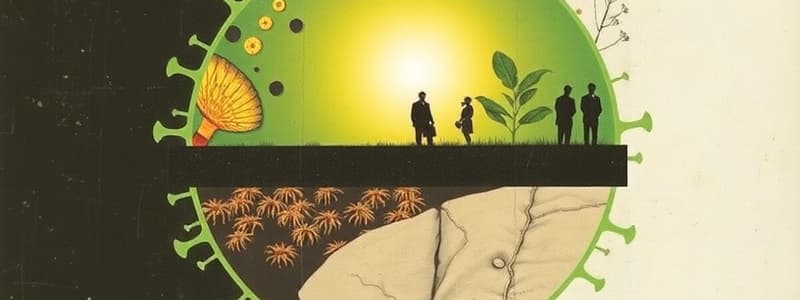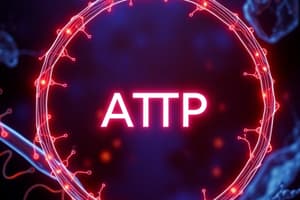Podcast
Questions and Answers
What type of pigments are carotenoids primarily responsible for in plants?
What type of pigments are carotenoids primarily responsible for in plants?
- Green color
- Blue and purple color
- Brown color
- Yellow, bright red, and orange color (correct)
Which of the following fruits and vegetables is NOT a source of xanthophyll?
Which of the following fruits and vegetables is NOT a source of xanthophyll?
- Sweet potatoes
- Pumpkin
- Blueberries (correct)
- Carrots
Where do light reactions occur within the chloroplast?
Where do light reactions occur within the chloroplast?
- Outer membrane
- Stroma
- Thylakoids (correct)
- Cytoplasm
What is the primary by-product of the light reactions during photosynthesis?
What is the primary by-product of the light reactions during photosynthesis?
What is the purpose of the Calvin Cycle in photosynthesis?
What is the purpose of the Calvin Cycle in photosynthesis?
Which molecule is NOT a product returned to the light reactions from the Calvin Cycle?
Which molecule is NOT a product returned to the light reactions from the Calvin Cycle?
What is the main function of ATP in cellular processes?
What is the main function of ATP in cellular processes?
What general process do cells use to convert sugars into energy?
What general process do cells use to convert sugars into energy?
What is the main function of hydrolysis in biological processes?
What is the main function of hydrolysis in biological processes?
Which complex is primarily responsible for absorbing photons and transferring energy in plants?
Which complex is primarily responsible for absorbing photons and transferring energy in plants?
In Photosystem II, what is the wavelength of light that chlorophyll a absorbs?
In Photosystem II, what is the wavelength of light that chlorophyll a absorbs?
What is the primary role of pigments in plants?
What is the primary role of pigments in plants?
What is phosphorylation in biochemical processes?
What is phosphorylation in biochemical processes?
Which color light does chlorophyll primarily absorb?
Which color light does chlorophyll primarily absorb?
What characterizes the reaction-center complex of Photosystem I?
What characterizes the reaction-center complex of Photosystem I?
What technique is used to separate components of mixtures based on differences in structure or composition?
What technique is used to separate components of mixtures based on differences in structure or composition?
What is produced as a by-product during the light reactions of photosynthesis?
What is produced as a by-product during the light reactions of photosynthesis?
Which process takes place without the presence of oxygen?
Which process takes place without the presence of oxygen?
Which of the following processes produces ATP during cellular respiration?
Which of the following processes produces ATP during cellular respiration?
What is the primary function of the Krebs cycle?
What is the primary function of the Krebs cycle?
In which part of the chloroplast does the Calvin cycle occur?
In which part of the chloroplast does the Calvin cycle occur?
What role does NADP+ play in the light reactions of photosynthesis?
What role does NADP+ play in the light reactions of photosynthesis?
Which statement correctly describes the electron transport chain?
Which statement correctly describes the electron transport chain?
Which of the following statements about aerobic respiration is true?
Which of the following statements about aerobic respiration is true?
What is produced during the Krebs cycle for every two molecules of pyruvic acid?
What is produced during the Krebs cycle for every two molecules of pyruvic acid?
Which of the following describes the process of glycolysis?
Which of the following describes the process of glycolysis?
What role does ATP synthase play in cellular respiration?
What role does ATP synthase play in cellular respiration?
What is the end product of alcoholic fermentation?
What is the end product of alcoholic fermentation?
Which of the following statements about the electron transport chain is true?
Which of the following statements about the electron transport chain is true?
Where does pyruvate need to travel for full oxidation?
Where does pyruvate need to travel for full oxidation?
What common product is formed during lactic acid fermentation?
What common product is formed during lactic acid fermentation?
What process describes the movement of ions across a semipermeable membrane down their electrochemical gradient?
What process describes the movement of ions across a semipermeable membrane down their electrochemical gradient?
Flashcards
Hydrolysis
Hydrolysis
The process of breaking down bonds between phosphate groups.
Phosphorylation
Phosphorylation
Adding a phosphate group to an organic compound.
ATP
ATP
The energy currency of the cell.
Photosystem
Photosystem
Signup and view all the flashcards
Chlorophyll
Chlorophyll
Signup and view all the flashcards
Photosynthesis Light Reaction
Photosynthesis Light Reaction
Signup and view all the flashcards
Pigment
Pigment
Signup and view all the flashcards
Chromatography
Chromatography
Signup and view all the flashcards
Carotenoids
Carotenoids
Signup and view all the flashcards
Xanthophylls
Xanthophylls
Signup and view all the flashcards
Light Reactions
Light Reactions
Signup and view all the flashcards
Calvin Cycle
Calvin Cycle
Signup and view all the flashcards
Chloroplast Grana
Chloroplast Grana
Signup and view all the flashcards
Thylakoid Space
Thylakoid Space
Signup and view all the flashcards
Photosynthesis
Photosynthesis
Signup and view all the flashcards
Chloroplast
Chloroplast
Signup and view all the flashcards
Photosynthesis
Photosynthesis
Signup and view all the flashcards
Aerobic Respiration
Aerobic Respiration
Signup and view all the flashcards
Anaerobic Respiration
Anaerobic Respiration
Signup and view all the flashcards
Light Reaction
Light Reaction
Signup and view all the flashcards
Glycolysis
Glycolysis
Signup and view all the flashcards
Krebs Cycle
Krebs Cycle
Signup and view all the flashcards
Electron Transport Chain
Electron Transport Chain
Signup and view all the flashcards
ATP
ATP
Signup and view all the flashcards
Pyruvate Breakdown
Pyruvate Breakdown
Signup and view all the flashcards
Krebs Cycle Output
Krebs Cycle Output
Signup and view all the flashcards
Electron Transport Chain
Electron Transport Chain
Signup and view all the flashcards
Glycolysis
Glycolysis
Signup and view all the flashcards
Alcoholic Fermentation
Alcoholic Fermentation
Signup and view all the flashcards
Lactic Acid Fermentation
Lactic Acid Fermentation
Signup and view all the flashcards
Cellular Respiration
Cellular Respiration
Signup and view all the flashcards
ATP Synthase
ATP Synthase
Signup and view all the flashcards
Study Notes
Hydrolysis and Phosphorylation
- Hydrolysis is the process of breaking down bonds between phosphate groups.
- Phosphorylation is the addition of phosphate to an organic compound.
Adenosine Triphosphate (ATP)
- ATP is the energy currency of the cell.
- ATP is composed of adenine, ribose, and three phosphate groups.
- The breakdown of ATP releases energy for cellular processes.
Chromatography
- Chromatography is a technique for separating components in mixtures based on differences in structure or composition.
Pigments
- Pigments are substances that absorb visible light.
- Different pigments absorb different wavelengths of light.
- Photoexcitation is the production of an excited state in a quantum system by absorbing a photon.
Photosynthesis
- Photosystems are aggregates of pigments and proteins in the thylakoid membrane that absorb photons and transfer energy.
- Light-harvesting complexes (antenna complexes) absorb photons and transfer energy to a reaction center.
- Reaction-center complexes contain chlorophyll a and a primary electron acceptor.
- Photosystem II (P680) and Photosystem I (P700) are involved in light-dependent reactions.
Chlorophyll
- Chlorophyll is a green pigment found in thylakoid membranes of chloroplasts.
- Chlorophyll absorbs blue and red light while reflecting green light.
Other Plant Pigments
- Anthocyanins are responsible for the red/purple colors in fruits.
- Carotenoids are responsible for yellow/orange colors in fruits and vegetables.
- Xanthophylls are carotenoids with oxygen-containing groups
Cell Work
- Chemical work involves building large molecules.
- Mechanical work involves movement, like muscle contraction.
- Transport work involves moving substances across membranes against their concentration gradient.
Light and Dark Reactions in Photosynthesis
- Light reactions occur in the thylakoid membrane.
- They use sunlight to produce ATP and NADPH, and split water to release oxygen.
- Dark reactions (Calvin cycle) occur in the stroma.
- They use ATP and NADPH to convert carbon dioxide into glucose.
Cellular Respiration
- Cellular respiration is a metabolic process that converts chemical energy into ATP.
- Aerobic respiration requires oxygen and produces 34 ATP per glucose molecule.
- Glycolysis is the first step of respiration.
- It involves breaking down glucose into pyruvate.
- The Krebs cycle further oxidizes pyruvate to produce carbon dioxide, NADH and FADH2.
- The electron transport chain uses the energy from NADH and FADH2 to create ATP.
- Anaerobic respiration (fermentation) does not require oxygen and produces less ATP.
Similarities/Differences Between Photosynthesis and Respiration
- Both processes use electron transport chains to generate ATP.
- Photosynthesis takes in CO2, water and releases O2, and glucose(sugars).
- Respiration takes in O2, glucose and releases CO2, and water.
Studying That Suits You
Use AI to generate personalized quizzes and flashcards to suit your learning preferences.




